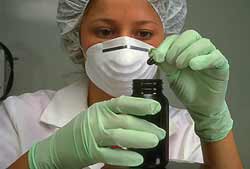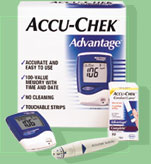
The conclusions of the DCCT that lowering blood glucose has a beneficial effect on complications in Type 1 diabetes can now be extended without reservation to Type 2 diabetes. The glycemic treatment goal should be HGA1c less than 7.0%, and blood pressure mean BP 144/82. Insulin and sulfonylurea drugs should not be avoided in managing patients with Type 2 diabetes. Indications for metformin treatment remain unchanged from current clinical guidelines; metformin use together with sulfonylurea drugs needs further study by randomized clinical trial. The UKPDS results mandate aggressive blood glucose and blood pressure control in Type 2 diabetes from the time of diagnosis on.
The US government is currently holding clinical trials to determine the cost/benefit ratio of tight glycemic control of type 2 diabetes, and will undoubtedly make recommendations based on those trials.
YOU, however, should regard those recommendations (whatever they might be), with caution if you don't wish to become a 'cost/benefit' statistic. Your concern must be with the best treatment for your health, period. And the costs that are accrued with tight treatment are largely a result of diabetes teams and doctors doing all the management. Diabetician believes that YOU must become the manager of your treatment, with the supervision of diabetes professionals, but with far less day to day involvement on their part.. You can achieve this by learning the control basics and monitoring your blood glucose and blood pressure levels adequately.
"After several clinical trials in both type 1 and type 2 DM, there is a reasonable certainty that about half of the incidence and rate of progression of indicators of microvascular complications (retinopathy, nephropathy, and neuropathy) can be prevented or delayed by achieving and maintaining near-normalization of glycemic levels. Consequently, there has been a uniform trend in recent guidelines to advise a near-normalization of glycemic levels in both type 1 and type 2 DM. Note, however, that the clinical consequences of microvascular deterioration are dependent not only on glycemic levels but also on the duration of the disease. With the early onset of diabetes typical in type 1 patients, there is sufficient time for development of clinical microvascular complications, and prevention of these complications is a goal of treatment in type 1 diabetics. In contrast, the prevalence of hard clinical endpoints indicative of microangiopathy, such as renal failure or blindness, is very low in patients in whom the disease is diagnosed after the 5th decade, the greatest age of prevalence of patients with type 2 DM in this country. Furthermore, microvascular complications can be minimized by the well-established benefits of blood pressure and lipid control, as well as by therapeutic intervention (photocoagulation, cataract extraction). Since the costs and efforts necessary to reach near-normal levels of glycemia are very high, there is a need to determine the cost/benefit ratios of such expenditures in the population subject to type 2 diabetes."
These statements seem to ignore the fact that the UKPDS trials were done with type 2 diabetics only, and so the parameters of time the writer of these statements is concerned with are irrelevant.
Diabetician is dedicated to giving the diabetic the knowledge and tools to control the disease, rather than letting the disease control the health and life of the diabetic. Learn to do this, to take complete control, and you will find that you can live your life much the same as do non-diabetics. You will, in fact, be healthier in many ways than non-diabetics, because while you are controlling your diabetes, you will also be controlling your health in general. As a diabetic, you must understand what is happening within your body as a result of what you do: What happens when you eat, when you sleep, when you exercise, and when you don't exercise. You will learn the effects of the right foods in the right amounts and the wrong food in the wrong amounts, when to exercise and when not to exercise, how to control your moods; control whether you feel energetic or tired or alert or sleepy (most of which is directly related to blood sugar and blood pressure levels), and, more importantly, you will learn how to make all of this habit, so that you don't have to spend all of your time worrying about your health.

The programs Diabetician is recommending are not
difficult; in ten days you will begin to enjoy the
physical and mental benefit of not only beginning
to control your diabetes, but finding yourself in
better condition and mood than you've been in
a long, long time.
Diabetes is a progressive disease, but the degree of progression can
be greatly reduced; at the least, tight control can delay the onset of secondary illness for many years.
You can Control your diabetes and live, live a long, healthy, active life!

Diabetician.com is under development. Check the site
from time to time, as we are building the site publically
and will be adding information on a daily basis. In the
meantime, Diabetician.com will help you stay abreast
of the latest science breakthroughs and diabetes news
to help you win your battle against diabetes. Check it
often.
Control your diabetes!
Your life depends on it!
|
